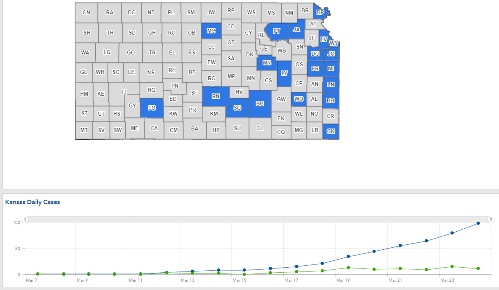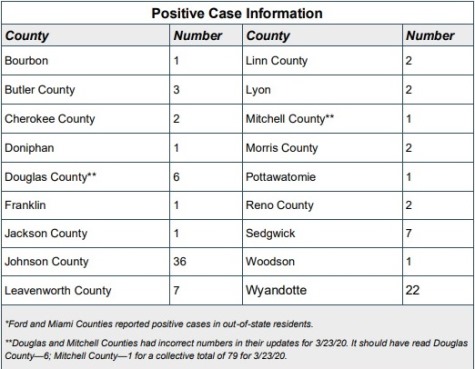Wyandotte County increases to 22 cases

On the first “stay-home” day in Wyandotte County, the numbers of COVID-19 cases continued to grow both in Wyandotte County and in Kansas.
The Kansas Department of Health and Environment reported 98 total positive COVID-19 cases in the state by 11 a.m. Tuesday, March 24. The total was 79 on Monday.
Five days ago, on Friday, March 20, the statewide case count was 44, according to KDHE statistics.
In Wyandotte County, the number grew to 22, according to state statistics, an increase of six cases from Monday.
Johnson County had the highest number of cases in the state, with 36 on Tuesday, as compared to 32 cases on Monday.
Sedgwick County, including Wichita, had two cases on Monday and seven cases on Tuesday.
Leavenworth County reported seven cases on Tuesday, and five cases on Monday.
Douglas County reported six cases on Tuesday, and the same number on Monday.
According to KDHE statistics, there were 57 male COVID-19 patients and 41 females.
The positive COVID-19 patients ranged in age from 7 years old to 90 years old, with a median age of 52, according to the KDHE statistics.
Doctors report more in-house testing
Testing is being done not just at the state health department.
Doctors at the University of Kansas Health System said they started testing COVID-19 cases on Sunday.
Also, private labs are now testing for COVID-19, when the test is ordered by the patient’s primary care doctor.
KDHE stated that 57 of the tests were from private labs, with 41 from the state lab. There were a total of 2,086 negative tests in Kansas, according to the KDHE. Roughly 4.4 percent of those who were tested were positive.
The more than 40 patients at KU Hospital who were possible COVID-19 patients were causing the hospital to use up supplies of personal protective equipment while they were waiting for test results, according to hospital officials on Monday.
In an effort to conserve supplies, the hospital has canceled elective surgery, with surgery ongoing for cancer patients and seriously ill patients. Some clinics have closed and they are making the transition to telemedicine. In an effort to stop the spread of COVID-19, visitors are not being allowed into KU Hospital currently, with a few exceptions. Those who need medical care have been asked to call their primary care doctor first and wait for instructions.
Doctors hope ‘stay-home’ orders flatten the curve
Doctors at the University of Kansas Health System said today they are hoping that “stay-home” orders that went into effect today in Wyandotte County and other neighboring counties will help flatten the curve. They spoke at a news teleconference.
Dr. Steven Stites, chief medical officer of the KU Health Systems, said they are seeing an increasing number of cases, not overwhelming right now, and are probably two to three weeks away from accelerating into a spike in the Kansas City area. It will take two to six weeks to see what happens to the curve, he added.
Someone who gets sick now won’t know for seven to 14 days after that if they will need critical care.
“Flattening the curve is not a short-term game,” he said. It’s a commitment. And after the curve is flattened, if people run out and party, it’s not really flattened any more, he said.
“Make sure you’re doing the right thing about cleaning surfaces, washing your hands, keeping your distance, and staying home,” Dr. Stites said. “Those are the things we know that blunt the curve.”
Good hygiene practices matter
Dr. Dana Hawkinson, medical director of infection prevention and control at KU Health Systems, talked about good hygiene practices, including washing hands after coming back from the grocery store or other places. It’s not a bad idea to clean off containers, he said.
There isn’t a lot of evidence right now on how long the coronavirus lives on surfaces, just a little information published in medical journals that indicates it can survive a few hours. Eventually it will break down, whether from a few hours to a few days, and doctors are recommending cleaning surfaces regularly that people may touch.
Doctors think the virus mostly spreads from close contact with humans who are coughing or sneezing close to them, and sometimes from contact with surfaces.
Dr. Hawkinson said people often touch their faces 10 to 50 times an hour, and that often could be the way the disease is communicated.
Dr. Stites said hospital bed space is not a problem now in Kansas City, but they are a problem currently in New York. Doctors are hoping the smaller population density here and the seasonal changes will make a difference here.
“You’re in the first quarter, you’ve got the opening kickoff, you’ve got one first down, there’s a lot of game left,” Dr. Stites said.
Dealing with COVID-19 anxiety
Dr. Greg Nawalanic, clinical psychologist, said it’s OK to be anxious at this time. As long as everyone is doing everything they can, it gives them some sense of control, he said. Canceling trips, staying home, and avoiding contact with face and hands are good, he said.
“The more sacrifices we can make now in the short term and flatten the curve,” he said, “the sooner we can move past this, rather than if we’re continuing to take vacations or road trips or do whatever we feel we need to do for ourselves. We need to start thinking more as a collectivist culture than as an individual, and that can be a real challenge for Americans. I know that is something we can rise to.
“Nobody’s been asked to go to war, we’re literally being asked to sit home and kind of couch surf,” he said. It’s the time to do some things at home that people always wanted to do, he added.
Dr. Hawkinson said cancer patients and others also should try to eat healthy and get exercise to boost their immune systems.
Sleep is also important, he said, and is restorative for health.
Dr. Nawalanic recommended getting outside every day, if just for a walk. Those who exercise will be a little more tired at the end of the day and more likely to get more sleep at night, he added. Those who are on their phones, on the computer and watching TV before bedtime may experience more trouble getting to sleep.
“The best advice we can give is turn off all the screens,” he said, “an hour before their bedtime.”
Instead, read a book, talk to one another or spend time with the children, making sure they’re not on their screens, he said.
“Restful sleep is one of the best tools we have to keep our immune system up,” he said.

To view the news conference, visit
https://www.medicalnewsnetwork.org/NewsNetwork/DocTalk/C/Tuesday%20Media%20Briefing%20on%20COVID-19%20From%20The%20University%20of%20Kansas%20Health%20System%203-24-20
The UG’s COVID-19 response website is at
https://alpha.wycokck.org/Coronavirus-COVID-19-Information.
The Kansas COVID-19 website is at
https://govstatus.egov.com/coronavirus.
COVID-19 information from the CDC is at https://www.cdc.gov/coronavirus/2019-nCoV/index.html.
